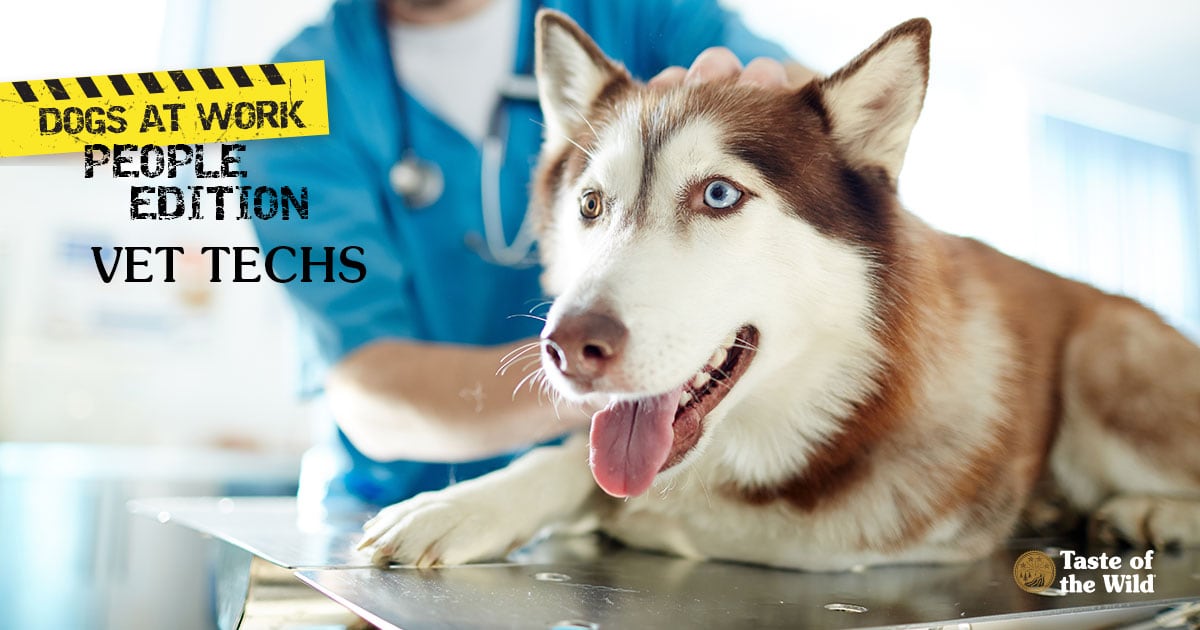Dogs at Work: A Day in the Life of Veterinary Technicians
Thursday, October 10, 2019 | Health

Whether you bring your pet to the veterinary clinic for blood tests, surgery or a dental cleaning, chances are, a veterinary technician will care for your dog or cat while they’re there. To help celebrate National Veterinary Technicians Week, we’ll tell you everything you need to know about the dedicated people who love up your pets at the veterinary clinic or hospital.
What, exactly, does a vet tech do?
In many ways, a technician is the veterinary equivalent of a human nurse. So much so that it has been proposed that changing the title to “veterinary nurse” might be more appropriate to promote greater understanding and respect for the important work technicians do.
In addition to nursing care, vet techs draw blood, place intravenous catheters, run lab tests (such as blood work and urinalyses), manage anesthesia and assist during surgeries, take X-rays, perform dental cleanings, trim toenails, care for hospitalized pets and help with pet owner education. Have a question about insulin injections or fleas and ticks? A vet tech can help.
In fact, technicians do just about everything around the clinic except those tasks reserved exclusively for veterinarians: making a diagnosis, prescribing medications and performing surgery.
Challenging education and clinical training programs
To become a technician, it’s not enough to love working with animals. Vet techs need specific training to learn the proper skills for the veterinary clinic. That includes studying clinical techniques by working with live animals and laboratory skills by training on diagnostic equipment, not to mention spending hours peering into a microscope.
While veterinary technicians have generally earned an associate’s degree (two years) from a school accredited by the American Veterinary Medical Association (AVMA), veterinary technologists typically earn a bachelor’s degree (four years) from an AVMA-accredited school.
Even after all that, candidates still need to pass a national board exam before they can be considered licensed, certified or registered veterinary technicians (LVT, CVT or RVT, depending on state regulations).
Then what does a veterinary assistant do?
With so many people at the clinic in scrubs, it’s easy to get them mixed up. Veterinary assistants may have some high school or certificate education in veterinary science, but generally, they’re trained by the veterinarian or vet tech to assist around the clinic, such as cleaning the surgery room or kennels, as opposed to being part of more advanced clinical tasks and procedures that vet techs take on.
Like veterinarians, vet techs can specialize, too
Veterinarians can become specialists in areas such as surgery, ophthalmology and behavior by taking advanced training in these areas. The same goes for vet techs. There are several specialty areas available, including emergency and critical care, dentistry, internal medicine, anesthesia and analgesia (pain management), dermatology, laboratory animal care, behavior, clinical practice, pathology, equine medicine, and physical rehabilitation.
To specialize, the vet tech must complete all the training outlined above, plus devote about 75 percent of their time working in that area and pass a certification exam. The next time you’re at your veterinary clinic, make sure to thank the vet techs for all they do to help your pet.
The information in this blog has been developed with our veterinarian and is designed to help educate pet parents. If you have questions or concerns about your pet’s health or nutrition, please talk with your veterinarian.




